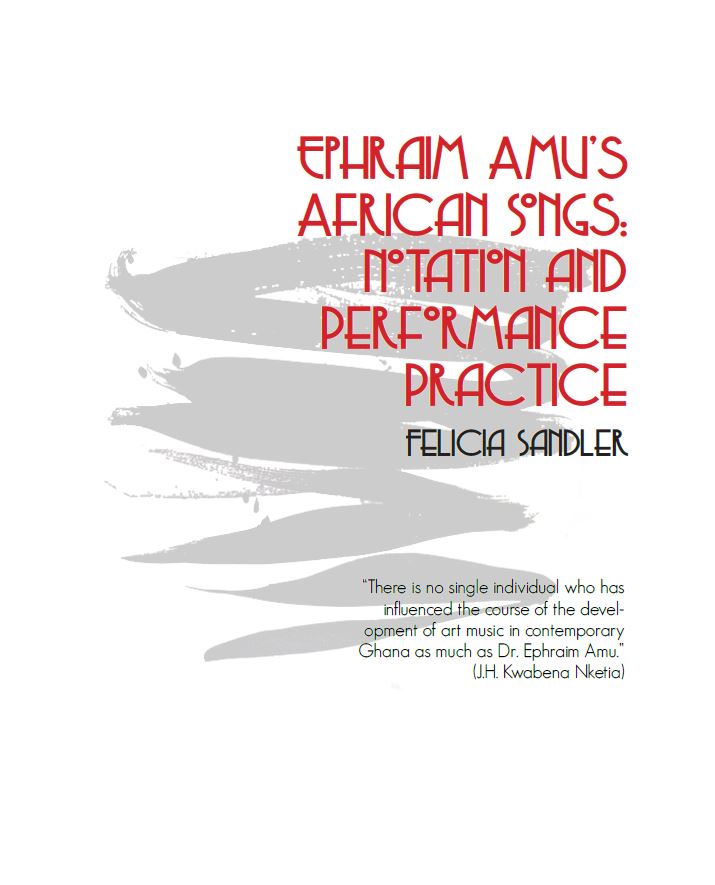
The November 2019 issue of Choral Journal is now available online! This issue features an article written by Felicia Sandler titled “Ephraim Amu’s African Songs: Notation and Performance Practice.” Below is an excerpt of the article, and you can read it in its entirety in the November 2019 issue! Go to acda.org/choraljournal and click the image of the cover to read.
_____________________________
Dr. Ephraim Amu (1899-1995) is a towering figure in his native Ghana—a national treasure. His activities as composer, educator, preacher, theologian, and poet spanned the periods of colonialism, independence (March 6, 1957), and national reconstruction. He was one of the agents who helped move the country toward independence. 2 Amu’s image was displayed on Ghana’s national currency from 2002 until 2006, and his music is broadcast at the conclusion of both the Ghana Broadcasting Corporation and Ghana TV’s daily programs. For those of us active in the choral arts, Amu is of particular import in that he was the architect of the choral idiom in Ghana—an idiom that continues to hold sway over creative output in the country to this day.3 Kofi Agawu has noted that Amu’s “work of the 1920s and 1930s rapidly became the staple musical diet of many young musicians with an interest in composition [in Ghana]. And although there have been refinements and developments in technique since then, few composers have succeeded in escaping the influence of the basic idiom of his choral works.”4
Ironically—in light of his stature—the majority of Amu’s works remain unpublished and in manuscript form. Performance and study of his work locally and abroad is impaired by a dearth of scores. The development of a critical edition of his music is underway, and Galaxy Music, an imprint of ECS publishing Group, has just released three titles as a way of introducing non-Ghanaian choirs to his work and perhaps stirring interest in the wider corpus. 5 Roughly one quarter of Amu’s works have been published in five collections all out of print and containing errors. Though a number of scores are missing, autograph manuscripts fill most of the void but are nowhere near publishable. Together with his daughter, Misonu Amu, I am developing a new edition of Amu’s scores through a critical process comparing primary sources with published versions and audio recordings,6 in consultation with the Ghanaian members of our team who are intimately familiar with Amu’s music and performance practice.7 The new six-volume critical performance edition will present the works according to voicing. With roughly thirty titles per volume, they will be organized as follows: 1-3) three volumes—SATB scores, 4) one volume—TTBB scores, 5) one volume—unison/duet/trio works, and 6) one volume—instrumental pieces.
In this article I will explore the evolution of Amu’s notational practice as exhibited in the three titles recently released by Galaxy. After a brief consideration of the choral tradition in Ghana, and introduction to Amu and his practice, I will provide an outline for the exploration to follow.
NOTES
1 J.H. Kwabena Nketia, “Introduction,” in Amu Choral Works,
Volume 1 (Accra: Waterville Publishing House, 1993).
2 On activities related to State and Nation-building, see Laryea, 2017.
3 Composers contemporary to Amu were, like he initially,
exploring Western idioms. Amu is acknowledged as the
father of Ghanaian art music. See Godwin Kwafo Adjei,
“Classical Music in Ghana,” https://www.musicinafrica.
net/magazine/classical-music-ghana (last accessed
4/22/2019).
4 Kofi Agawu, “The Amu Legacy: Ephraim Amu 1899-1995,”
Africa: Journal of the International African Institute, 66, No. 2
(1996): 277. Amu’s infl uence is not limited to Ghana. NB
the incorporation of his music in the orchestral African
Suite of Nigerian composer Fela Sowande (1905-1987).
5 An introduction to the songs by Agawu is found here: http://
www.canticledistributing.com/wp/introducing-threesongs-
by-ephraim-amu/ (last accessed 6/18/2019).
6 Select recordings include: Dwenesie Sings Amu (1970s),
Dinah Reindorf conducting; GHANA ASUAFO RETO
DWOM (Request Records Inc. SLRP 5027, 1977),
Ephraim Amu conducting; the University of Ghana
Men’s chorus at the Second International University
Choral Festival (Lincoln Center, 1969), Ephraim Amu
conducting; Choral Works of Ephraim Amu, Misonu Amu
conducting, engineered by Willie Anku; the West Volta
Presbytery Chorus, Misonu Amu conducting; three
recordings acquired from the GBC (July 2016); recordings
by Hilarius Wuaku’s chorus (July 2016); Harmonious
Chorale https://www.youtube. com/user/fremprince1/
videos (last accessed 6/16/2019).
7 The working team: Felicia Sandler (director), Misonu Amu,
Kofi Agawu, George W.K. Dor. The advisory team:
Hilarius Wuaku, the Rev. Philip T. Laryea, David Locke.
_________________________________
Read the rest of this article (and more!) in the November 2019 issue of Choral Journal, available online at acda.org.

+(1).gif)
Leave a Reply
You must be logged in to post a comment.